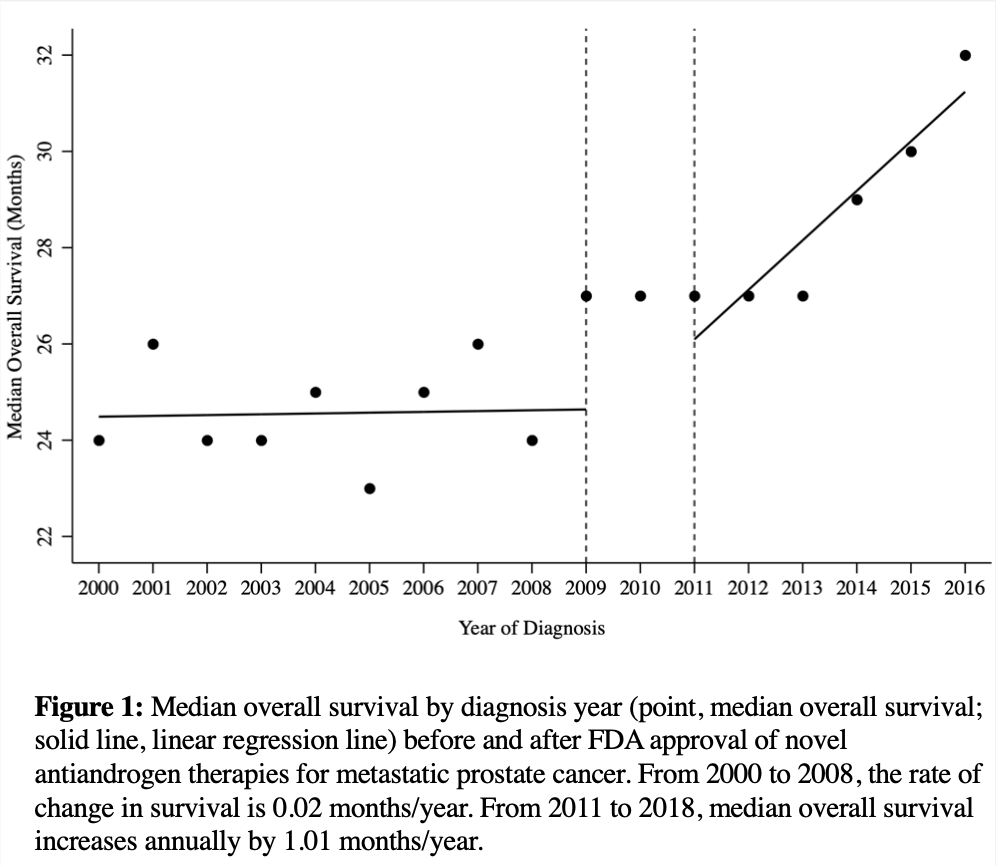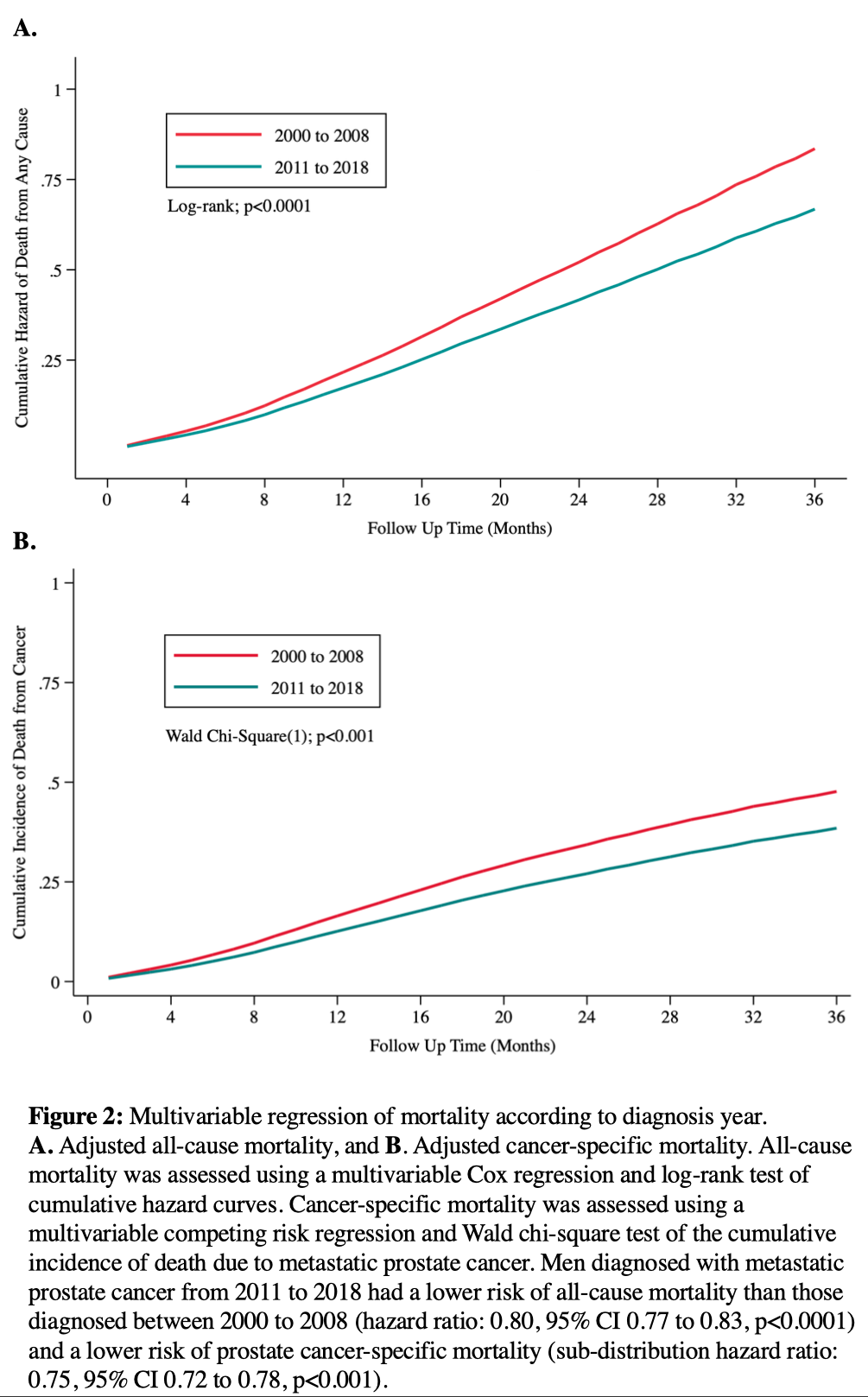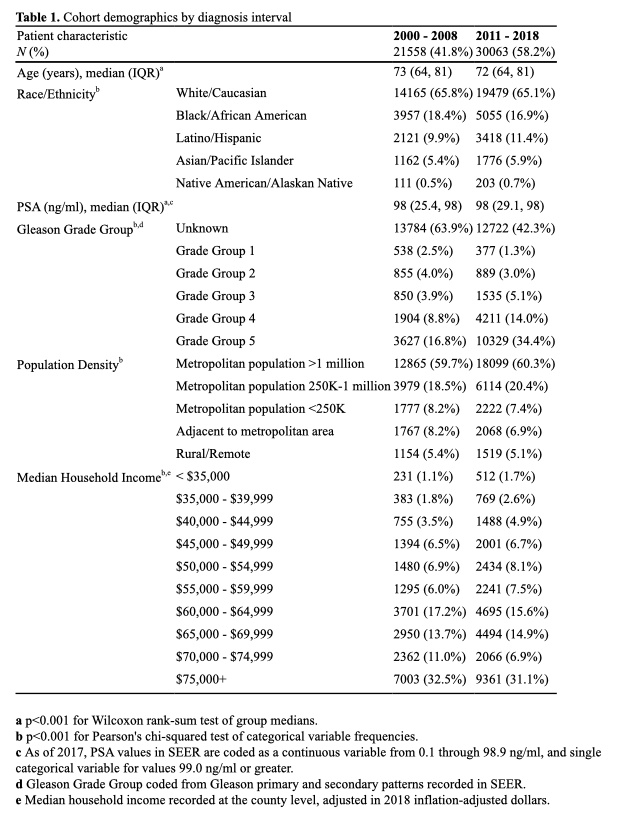Back
Poster, Podium & Video Sessions
Podium
PD03: Prostate Cancer: Epidemiology & Natural History I
PD03-10: Effect of Advances in Treatment on Population-level Survival of Patients with Metastatic Prostate Cancer
Friday, May 13, 2022
8:30 AM – 8:40 AM
Location: Room 245
Danly O. Omil-Lima, Xian Wu, Mercedes A. Kent, Camilo Arenas Gallo*, Ilon Weinstein, Sarah C. Markt, Jennifer C. Cullen, Lee E. Ponsky, Jorge A. Garcia, Cleveland, OH, Jim C. Hu, Christopher E. Barbieri, NEW YORK, NY, Daniel E. Spratt, Jonathan E. Shoag, Cleveland, OH

Camilo Arenas Gallo, MD (he/him/his)
Research Fellow
Case Western Reserve University
Podium Presenter(s)
Introduction: Advances in therapies have been shown in clinical trials to provide survival benefits for men with metastatic prostate cancer. Whether these benefits translate into improved population-wide outcomes is unknown. We aimed to determine whether novel treatments in the past decade have yielded improved survival among men with metastatic prostate cancer.
Methods: Using the Surveillance, Epidemiology, and End Results database, we identified patients with newly diagnosed metastatic prostate cancer between 2000-2018. Our primary outcome was all-cause mortality (ACM) by diagnosis year interval: men diagnosed between 2000-2008 compared to after 2011 (approval of Abiraterone). The cumulative hazard curves and hazard ratios (HR) for ACM were estimated using multivariable Cox regression. Interrupted time-series analysis was used to model yearly change in ACM and competing-risk regression was used to determine cancer-specific mortality (CSM) and the cumulative incidence of death due to metastatic prostate cancer.
Results: Final study population included 21,558 men with metastatic prostate cancer diagnosed between 2000-2008, and 30,063 men diagnosed after 2011. Men diagnosed after 2011 had improved ACM compared to men diagnosed from 2000-2008 (median survival 37 vs 30 months, p<0.001). Median overall survival of patients has increased by one month for every year of diagnosis after 2011. Diagnosis after 2011 was associated with lower ACM, HR 0.80 (95% confidence interval (CI) 0.77 to 0.83), p<0.001, and reduced CSM compared to those diagnosed from 2000-2008, HR 0.75 (95% CI 0.72 to 0.78), p<0.001.
Conclusions: Survival among men with metastatic prostate cancer has improved markedly with advances in medical therapy.
Source of Funding: JES and JCH are supported by the Wallace Fund of the New York Community Trust. JES is supported by the Frederick J. and Theresa Dow Foundation of the New York Community Trust, Vinney Scholars Award, Damon Runyon Cancer Research Foundation Physician Scientist Training Award and American Cancer Society Early Career Award.



Methods: Using the Surveillance, Epidemiology, and End Results database, we identified patients with newly diagnosed metastatic prostate cancer between 2000-2018. Our primary outcome was all-cause mortality (ACM) by diagnosis year interval: men diagnosed between 2000-2008 compared to after 2011 (approval of Abiraterone). The cumulative hazard curves and hazard ratios (HR) for ACM were estimated using multivariable Cox regression. Interrupted time-series analysis was used to model yearly change in ACM and competing-risk regression was used to determine cancer-specific mortality (CSM) and the cumulative incidence of death due to metastatic prostate cancer.
Results: Final study population included 21,558 men with metastatic prostate cancer diagnosed between 2000-2008, and 30,063 men diagnosed after 2011. Men diagnosed after 2011 had improved ACM compared to men diagnosed from 2000-2008 (median survival 37 vs 30 months, p<0.001). Median overall survival of patients has increased by one month for every year of diagnosis after 2011. Diagnosis after 2011 was associated with lower ACM, HR 0.80 (95% confidence interval (CI) 0.77 to 0.83), p<0.001, and reduced CSM compared to those diagnosed from 2000-2008, HR 0.75 (95% CI 0.72 to 0.78), p<0.001.
Conclusions: Survival among men with metastatic prostate cancer has improved markedly with advances in medical therapy.
Source of Funding: JES and JCH are supported by the Wallace Fund of the New York Community Trust. JES is supported by the Frederick J. and Theresa Dow Foundation of the New York Community Trust, Vinney Scholars Award, Damon Runyon Cancer Research Foundation Physician Scientist Training Award and American Cancer Society Early Career Award.




.jpg)
.jpg)